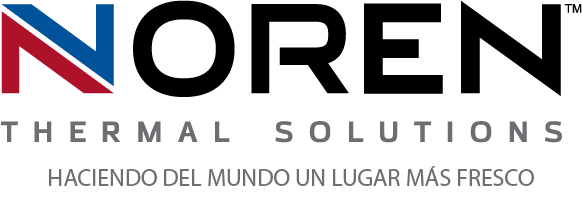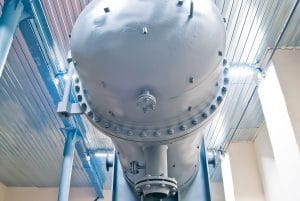 Electrical thermal management used to be straight-forward, to the point where companies used to have little choice in how they accomplish it. For most industrial applications, companies had to rely on solutions like air conditioners or air compressors to stop excess waste heat from gathering inside of electrical enclosures. These days, the goal of preventing damage from overheating is the same, though there are many different options for how to accomplish it. In many cases, custom heat exchangers are often the ideal solution, thanks largely to the natural processes they use to transfer electrical waste heat, such as phase-change cooling. (more…)
Electrical thermal management used to be straight-forward, to the point where companies used to have little choice in how they accomplish it. For most industrial applications, companies had to rely on solutions like air conditioners or air compressors to stop excess waste heat from gathering inside of electrical enclosures. These days, the goal of preventing damage from overheating is the same, though there are many different options for how to accomplish it. In many cases, custom heat exchangers are often the ideal solution, thanks largely to the natural processes they use to transfer electrical waste heat, such as phase-change cooling. (more…)
Understanding the Advantages of Custom Thermal Pins
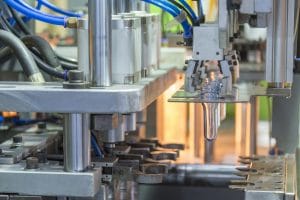 Heat exchangers have transformed electrical enclosure cooling and other thermal management processes over the last few decades. Yet, their impact has gone far beyond conventional electrical cooling in that time. In many instances, heat exchangers and custom thermal solutions based off of their heat transfer principles have become staples in several essential processes. For example, in the molding industry, where rapidly removing heat from molds is core to the production process, the ability to absorb and transfer heat efficiently and with minimal energy has proven invaluable. Thanks to specialized heat exchangers known as thermal pins, molding companies can apply the same innovative heat transfer principles to their machine tool cooling processes. (more…)
Heat exchangers have transformed electrical enclosure cooling and other thermal management processes over the last few decades. Yet, their impact has gone far beyond conventional electrical cooling in that time. In many instances, heat exchangers and custom thermal solutions based off of their heat transfer principles have become staples in several essential processes. For example, in the molding industry, where rapidly removing heat from molds is core to the production process, the ability to absorb and transfer heat efficiently and with minimal energy has proven invaluable. Thanks to specialized heat exchangers known as thermal pins, molding companies can apply the same innovative heat transfer principles to their machine tool cooling processes. (more…)
A Few Advantages of Custom Pipe Heat Exchangers
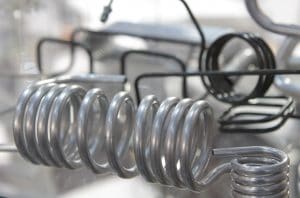 While there are many different types of heat exchangers these days, heat pipes are among the most popular and frequently implemented types. For companies that choose to implement heat exchangers to meet their electrical thermal management needs, heat pipes are often the preferable solution for many different reasons. For example, their highly efficient passive cooling abilities make heat pipe heat exchangers a cost-efficient yet high-performance method of cooling even the most demanding applications. Today, we examine just a few of the advantages that custom heat pipe heat exchangers provide, and when they may be the best option for a company’s electrical thermal management needs. (more…)
While there are many different types of heat exchangers these days, heat pipes are among the most popular and frequently implemented types. For companies that choose to implement heat exchangers to meet their electrical thermal management needs, heat pipes are often the preferable solution for many different reasons. For example, their highly efficient passive cooling abilities make heat pipe heat exchangers a cost-efficient yet high-performance method of cooling even the most demanding applications. Today, we examine just a few of the advantages that custom heat pipe heat exchangers provide, and when they may be the best option for a company’s electrical thermal management needs. (more…)
What Can Specialized Heat Exchangers Accomplish?
 Even in their conventional forms, modern heat exchangers can accomplish a great deal for companies looking to streamline their electrical thermal management solutions. That’s because their ability to transfer waste heat rapidly, consistently, and in a minimally invasive manner has made heat exchangers a more cost and energy efficient solution for a wide range of applications. Today, heat exchangers come in many different forms and offer many different advantages for the companies that use them. In many cases, specialized iterations of the advanced thermal solutions can help further boost a company’s ability to streamline other thermal management processes, as well. (more…)
Even in their conventional forms, modern heat exchangers can accomplish a great deal for companies looking to streamline their electrical thermal management solutions. That’s because their ability to transfer waste heat rapidly, consistently, and in a minimally invasive manner has made heat exchangers a more cost and energy efficient solution for a wide range of applications. Today, heat exchangers come in many different forms and offer many different advantages for the companies that use them. In many cases, specialized iterations of the advanced thermal solutions can help further boost a company’s ability to streamline other thermal management processes, as well. (more…)
How Modern Industries Are Benefiting from Heat Exchangers
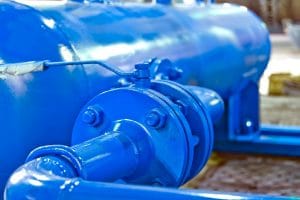 Electrical cooling is the kind of process that every company in every industry has to be concerned about. Most of them rely on technology to power their everyday operations, from optimizing resources and producing products to streamlining customer service and administrative work, and much more. Because of this technological reliance, every company in every industry also relies on effective, high-performance electrical thermal management solutions. The systems used to cool modern technologies play a huge role in the efficiency and effectiveness of those technologies. For many companies, heat exchangers help optimize that role to ensure safe, eco-friendly, and highly reliable electrical cooling for applications of all kinds. (more…)
Electrical cooling is the kind of process that every company in every industry has to be concerned about. Most of them rely on technology to power their everyday operations, from optimizing resources and producing products to streamlining customer service and administrative work, and much more. Because of this technological reliance, every company in every industry also relies on effective, high-performance electrical thermal management solutions. The systems used to cool modern technologies play a huge role in the efficiency and effectiveness of those technologies. For many companies, heat exchangers help optimize that role to ensure safe, eco-friendly, and highly reliable electrical cooling for applications of all kinds. (more…)
Should Thermal Solutions Really Be Custom?
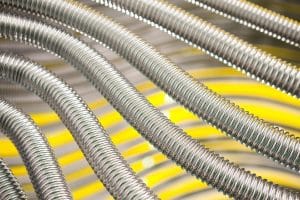 With today’s advanced technology and equally advanced electrical cooling systems, it’s no wonder that many companies are now taking advantage of custom thermal management solutions to meet their cooling needs. Not only do custom solutions offer more precise and reliable results, but in many cases, customizing the right solution is easier, more efficient, and more affordable than ever. Today, we examine a few of the advantages of utilizing custom thermal solutions, and why increasingly more companies are choosing to rely on them and their benefits. (more…)
With today’s advanced technology and equally advanced electrical cooling systems, it’s no wonder that many companies are now taking advantage of custom thermal management solutions to meet their cooling needs. Not only do custom solutions offer more precise and reliable results, but in many cases, customizing the right solution is easier, more efficient, and more affordable than ever. Today, we examine a few of the advantages of utilizing custom thermal solutions, and why increasingly more companies are choosing to rely on them and their benefits. (more…)
A Look at How Heat Exchangers Help Boost Wastewater Treatment
 Heat exchangers help companies do a lot more with a lot less. Although they’re solely a thermal management solution, streamlining thermal management can have resounding benefits for a company’s overall operations. For example, by simplifying electrical thermal management, heat exchangers help reduce the costs of keeping electrical equipment cooled and a company’s overall dependence on energy. In some cases, heat exchangers can also help provide the same benefits to processes outside of electrical enclosure cooling. For example, they’re increasingly more often being used to help companies make treating wastewater more efficient and reliable. (more…)
Heat exchangers help companies do a lot more with a lot less. Although they’re solely a thermal management solution, streamlining thermal management can have resounding benefits for a company’s overall operations. For example, by simplifying electrical thermal management, heat exchangers help reduce the costs of keeping electrical equipment cooled and a company’s overall dependence on energy. In some cases, heat exchangers can also help provide the same benefits to processes outside of electrical enclosure cooling. For example, they’re increasingly more often being used to help companies make treating wastewater more efficient and reliable. (more…)
Can Heat Exchangers Work Under Rugged Conditions?
 Thanks to their innovative thermal management capabilities and streamlined methods of transferring electrical waste heat, heat exchangers have long been one of the most frequently preferred cooling methods for some of the most advanced technologies. However, modern heat exchangers have gone through several evolutions and different iterations to meet increasingly more demanding thermal management needs. For example, many of today’s heat exchangers are not only highly efficient and reliable, but also ruggedized to provide essential thermal management benefits to applications that operate under the toughest conditions. (more…)
Thanks to their innovative thermal management capabilities and streamlined methods of transferring electrical waste heat, heat exchangers have long been one of the most frequently preferred cooling methods for some of the most advanced technologies. However, modern heat exchangers have gone through several evolutions and different iterations to meet increasingly more demanding thermal management needs. For example, many of today’s heat exchangers are not only highly efficient and reliable, but also ruggedized to provide essential thermal management benefits to applications that operate under the toughest conditions. (more…)
Just a Few Ways Companies Save with Heat Exchangers
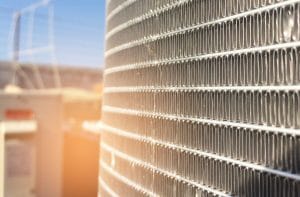 There are many different considerations that go into a company’s decision to choose heat exchangers over more traditional thermal management solutions. For some companies, the biggest consideration is often how much the switch can save them in time, money, energy, effort, and more. Since their introduction decades ago, heat exchangers have earned a name as one of the more efficient and cost-effective thermal management solutions. Today, we examine just a few of the reasons why, and how companies can typically save by implementing heat exchangers for most or all of their electrical cooling needs. (more…)
There are many different considerations that go into a company’s decision to choose heat exchangers over more traditional thermal management solutions. For some companies, the biggest consideration is often how much the switch can save them in time, money, energy, effort, and more. Since their introduction decades ago, heat exchangers have earned a name as one of the more efficient and cost-effective thermal management solutions. Today, we examine just a few of the reasons why, and how companies can typically save by implementing heat exchangers for most or all of their electrical cooling needs. (more…)
Things That Hinder Electrical Cooling (But Don’t Have To)
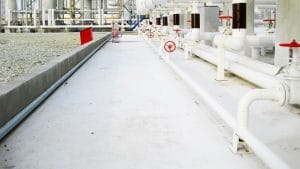 For many industries, electrical thermal management has long been an area where things like high costs and energy usage and frequent maintenance are par for the course. That’s because they rely on solutions that demand such considerations, such as HVAC equipment and air compression units. However, today’s companies more often choose more innovative heat exchangers and other custom thermal solutions that don’t come with such challenges, or make overcoming them significantly easier. With the help of heat exchangers, the things that were once necessary hindrances to electrical cooling are no longer as much of a concern. (more…)
For many industries, electrical thermal management has long been an area where things like high costs and energy usage and frequent maintenance are par for the course. That’s because they rely on solutions that demand such considerations, such as HVAC equipment and air compression units. However, today’s companies more often choose more innovative heat exchangers and other custom thermal solutions that don’t come with such challenges, or make overcoming them significantly easier. With the help of heat exchangers, the things that were once necessary hindrances to electrical cooling are no longer as much of a concern. (more…)

